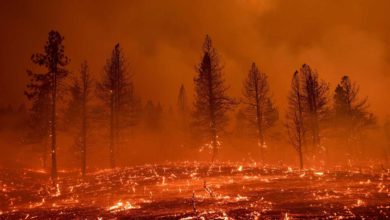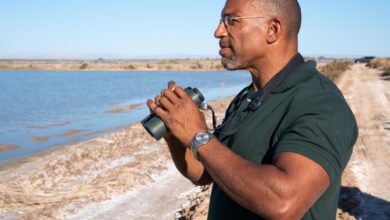
After a "crippling" winter storm dumped up to 4 feet of snow in the Rocky Mountains – closing roads, canceling flights and prompting avalanche warnings over the weekend – the storm on Monday was expected to dump snow on the Midwest and spark thunderstorms in the South.
"A band of moderate snow with some mixed precipitation is moving across the Midwest and should reach the upper Midwest and lower Michigan by tonight," forecasters at the National Weather Service said Monday morning.
The storm will cause "a burst of heavy snow" in Iowa and Minnesota before moving east, said AccuWeather senior meteorologist Dan Pydynowski. Eastern parts of South Dakota and Nebraska, Iowa, southern Minnesota, Wisconsin, Illinois and Michigan could all see the storm's effects.
The weather service in La Crosse, Wisconsin, and Des Moines, Iowa, said the snow could fall at a rate of over an inch per hour. Up to 18 inches could fall in areas along the Iowa and Minnesota border, according to AccuWeather.
The storm will also hit Chicago by the afternoon but turn into a wintry mix, Pydynowski said. Mixed precipitation was expected in the Appalachians by Monday night, the weather service said.
More on the 'historic and crippling' storm:25 inches of snow in Cheyenne, Wyoming; travel halted in Colorado and Nebraska
Meanwhile, thunderstorms were expected to roll through the South on Monday, lasting through Tuesday, before another system midweek sparks even more thunderstorms.
AccuWeather said the storm will stall over the South on Tuesday, "leading to rounds of downpours from Louisiana to the Carolinas throughout the day."
As the week continues, the severe weather "will tend to repeat itself," the weather service warned.
Another snowstorm was already pressing east in California and the Pacific Northwest on Monday. That system will bring more mountain snow and rain, and by Wednesday morning, "intensify over the southern Plains," the weather service said.
That could mean more thunderstorms, tornadoes and "torrential downpours" by midweek in Texas, Oklahoma, Arkansas, Louisiana, Tennessee, Mississippi and Alabama, according to AccuWeather.
Cold air on the back end of the storm means more snow is expected in the Rockies and northern Plains at the same time, the weather service said.
Over the weekend, the storm blanketed Colorado, Wyoming and Nebraska and led to widespread disruption of travel with the heaviest snow of the year in the West so far.
The 25.8 inches that fell in Cheyenne, Wyoming, this weekend smashed a previous two-day record held since 1979, according to the weather service.
Snowplows were driving off the roadway in the Casper, Wyoming, area due to poor visibility, causing the state's department of transportation to suspend plowing there.
The storm closed sections of Interstate 25 and Interstate 80 and led to many schools and government buildings closing for Monday. Denver International Airport and Northern Colorado Regional Airport also closed their runways on Sunday, with most flights already canceled.
The storm also sparked an avalanche warning west of Fort Collins, Boulder, Denver and Colorado Springs. The Colorado Department of Transportation said an avalanche blocked Highway 14 in north-central Colorado on Sunday.
Parts of Texas were also recovering from storms and tornadoes that hit over the weekend. In Amarillo, dozens of hikers were evacuated from a trail after two possible tornadoes in the area. Randall County Sheriff Christopher Forbis reported hail the size of baseballs.
“Power lines and a cell tower are down,” Amarillo Area Emergency Management Director Chad Orton said. “One house was damaged, but the family was in the basement ... there have been no injuries or fatalities.”
Heavy rains also drenched Texas and Oklahoma, and parts of Missouri saw 7 inches of rain Saturday.
Contributing: John Bacon and Elinor Aspegren; The Associated Press
Source link










